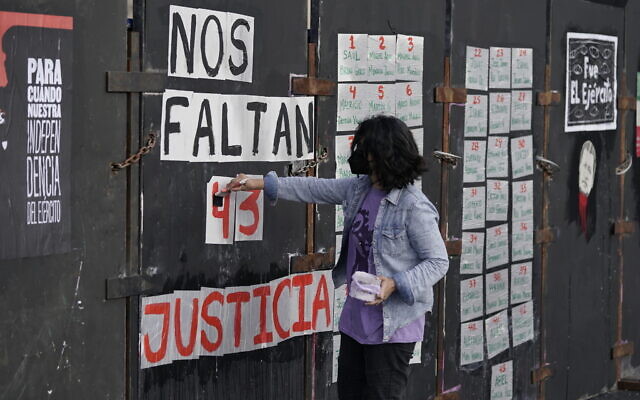The head of a commission investigating the 2014 disappearance of 43 students in southern Mexico flew to Israel to try to convince a wanted former senior official to cooperate, according to a Wednesday report.
Mexico’s former Criminal Investigation Agency chief Tomas Zeron is wanted on charges of compromising an investigation into the disappearance of 43 students in 2014. He is also accused of embezzling over $50 million and torturing suspects.
Zeron fled Mexico after the investigation into the mass abduction was reopened following the election of Mexican President Andrés Manuel López Obrador in 2019. He has been in Israel since and has applied for asylum.
A New York Times report last year said Israel was not cooperating with Mexico in its extradition request in protest of Mexico’s support for human rights investigations of Israel at the United Nations.
In February, a month after Mexico submitted an extradition request, head of the commission Alejandro Encinas flew to Israel and had a nearly three-hour lunch in Tel Aviv with Zeron, the Times reported Wednesday.
According to the report, Encinas “pleaded” with Zeron to give him more information on the case and offered the “president’s support” in exchange for any new information about the remains of the students.
Alejandro Encinas Rodriguez during a protest in front of the National Palace in Mexico City, Mexico, Aug. 30, 2019 (AP Photo/Marco Ugarte)
“The president doesn’t care about putting anyone in jail,” Encinas told Zeron, according to a recording of the conversation that the Times said it reviewed. Zeron faces up to 60 years in prison if convicted.
In an interview with the newspaper, Encinas said he believed Zeron may have valuable information and was only promising the president’s support that could include a reduced prison sentence.
A lawyer for Zeron, Liora Turlevsky, was quoted as saying that her client denied all accusations and is not withholding any evidence connected to the students.
A Mexican official told the Times last year that Zeron had received assistance from Israeli firms he has ties to, such as controversial private intelligence firm NSO Group, whose spyware the fugitive reportedly authorized for use.
NSO denied ever assisting Zeron, and the Times said no direct proof of the allegation was provided. An international media investigative effort called The Cartel Project reported that he had fled to Israel with help from his contacts in the country’s cyber-surveillance industry.
The report said Encinas made the trip to Israel to meet with Zeron because he was under pressure for an announcement on the case, even though investigators had not concluded their investigations.
Two months after the meeting, the commission received a trove of WhatsApp messages that seemed to provide a breakthrough in the case. However, Encinas said that much of it cannot be validated.
Last month, a group of international experts denounced the rush to show results, and raised doubts about some evidence included in the report by the government’s Truth Commission investigating the case.

A youth paints “We are missing 43. Justice,” on a police barricade placed in front of the National Palace during a march for the missing 43 Ayotzinapa college students in Mexico City, Sept. 26, 2022, on the day of the anniversary of the disappearance of the students in Iguala, Guerrero state (AP Photo/Eduardo Verdugo)
The Truth Commission’s report in August included new information about the military’s involvement in the disappearances, including screen captures of messages indicating that military personnel allegedly gave the order to kill some of the students and hid their remains.
The experts, however, raised doubts about those messages, which they said were written very differently from messages intercepted by US authorities.
At the time, Encinas said that “no one has pressured me” and that “there are not political times” in the case, adding that the issues raised by the independent experts can be addressed.
The disappearance of the 43 teaching students shocked Mexico and sparked mass protests against then-president Pena Nieto’s government.
The students had taken five buses to travel to a demonstration but were stopped by corrupt police in the city of Iguala, Guerrero and handed over to a drug cartel.
Prosecutors initially said the cartel mistook the students for members of a rival gang and killed them before incinerating their bodies at a garbage dump and tossing the remains in a river.
However, independent experts from the Inter-American Commission on Human Rights rejected the government’s conclusion, and the families of the victims continue to demand answers.
Agencies contributed to this report.
